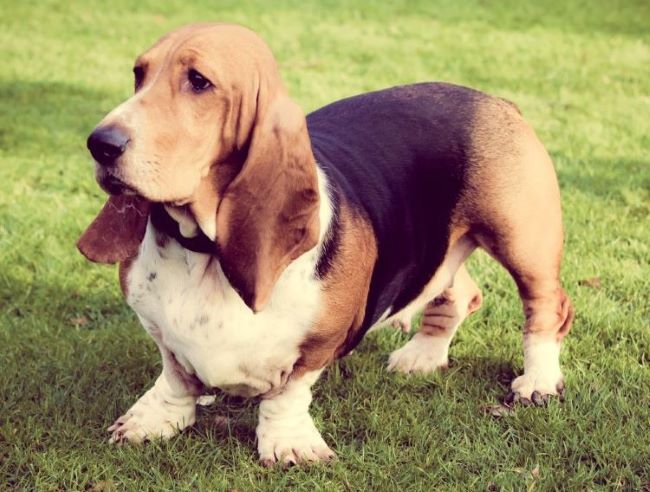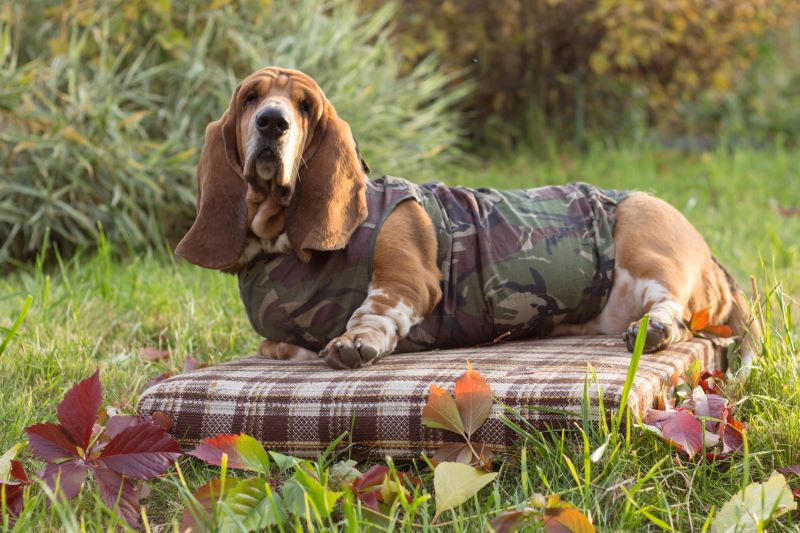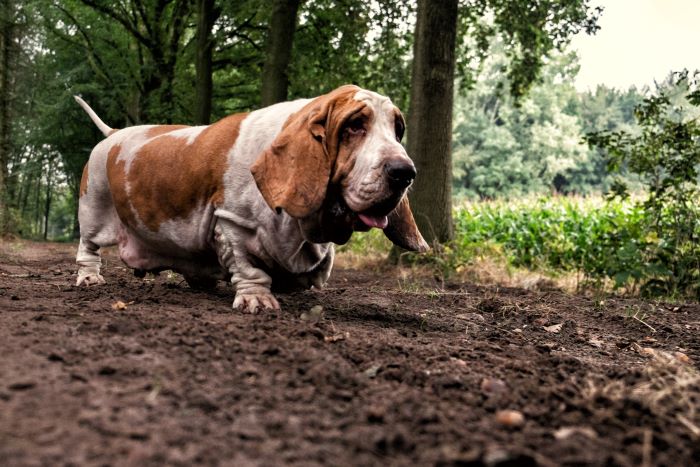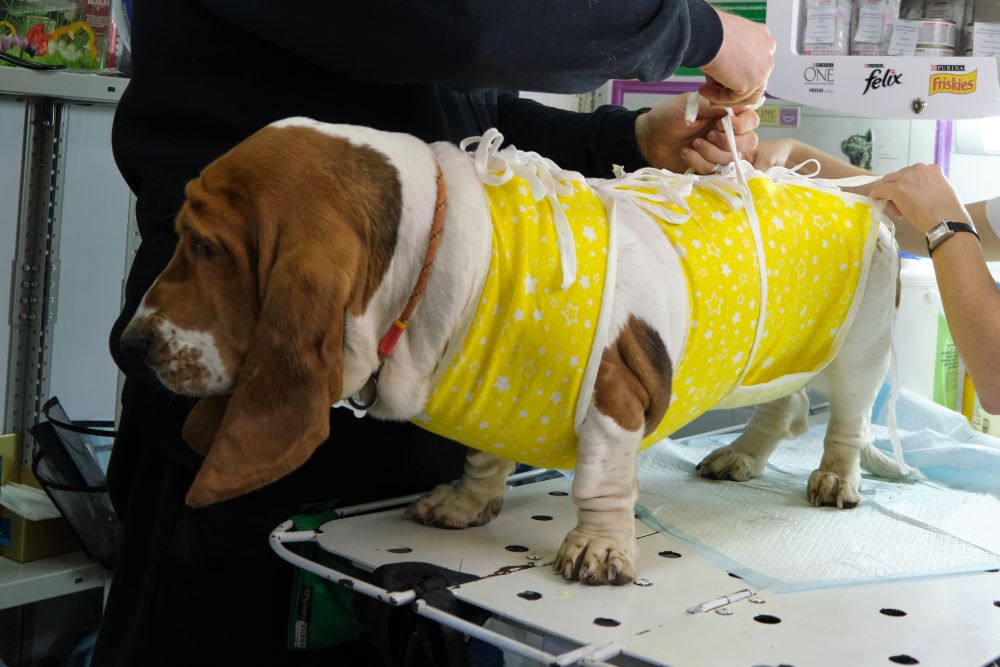Get Pet Insurance for your Cat & Dog

Zero
Documentation
Quick
Claim Process
Affordable
Premium
Terms and conditions apply*
- {{species}}
- {{indoorOutdoor}}
- {{suminsured}}
Basset Hound Dog Breed Characteristics & Information

Basset Hound dogs are a unique and endearing breed that has captured the hearts of dog lovers worldwide. With their long ears, droopy, sad-looking eyes, and distinctive low-slung bodies, Basset Hounds are unmistakable and unforgettable.
In this article, we will delve into what makes Basset Hound dogs special, explore their characteristics, and provide valuable information on how to care for and train these wonderful companions.
What is Special About Basset Hound Dogs?
Basset Hounds are popular in the United States and known for their calm temperament and exceptional sense of smell. The state with the most Basset Hounds is likely Oklahoma, given its large population and love for dogs.
One of the most famous Basset Hounds was "Cleo" from the TV show "The People's Choice," gaining recognition for her role and charming personality.
What are the Characteristics of Basset Hound Dogs?

To truly understand and appreciate Basset Hound dogs, it's essential to familiarise yourself with their key characteristics.
- Lifespan: Basset Hound dogs typically have a lifespan of 10 to 12 years, although some may live longer with proper care and a healthy lifestyle.
- Height: These dogs have a short stature, standing with an average height of a male Basset Hound is 30 to 38 cm tall, and the height of a female dog is 28 to 36 cm tall.
- Colour: Basset Hound dogs come in various coat colours, including tricolour (black, white, and brown), red and white, lemon and white, and mahogany and white.
- Weight: Their weight can vary, but most Basset Hounds weigh between 18 to 29 kg. They are a relatively heavy breed for their size.
- Behaviour and Personality: Basset Hounds are known for their gentle and laid-back personalities. They are good with children and other pets.
- Living Conditions: Basset Hounds can be good city dogs and live in various settings. They make excellent family dogs, but you must have playtime with them.
- Coat: Basset Hound dogs have a short, dense coat that is easy to care for. They shed lightly, and they require minimal grooming.
- Breed Group: Basset Hound dogs belong to the Hound group, which is known for its strong hunting instincts, and they are very persistent trackers.
- Sense of Smell: Basset Hounds are known for their exceptional sense of smell. Their keen olfactory abilities make them excellent tracking and hunting dogs.
- Temperament: Bassets are famous for their sweet, calm and friendly temperament. They like to be around people, stay loyal, and become close to their owners.
- Indoor Pet: Basset Hounds can make good indoor pets. You can even leave them alone for a short time period, but they can become destructive if left alone for longer.
How to Train Basset Hound Dogs?

Training a Basset Hound can be a difficult task, but you need to be patient and do it regularly. Here are some important tips for training:
Obedience Commands: Start with basic obedience commands like sit, stay, and come. When teaching your Basset Hound, begin with simple commands and then move on to harder ones over time.
Nose Time: Basset Hounds have an incredible sense of smell. Engage them in scent-related activities to keep their minds active, such as hide and seek with treats or toys.
Behavioural Training: Basset Hounds respond well to positive reinforcement. Reward good behaviour and avoid harsh punishment, as it can make them more obstinate.
Crate Manner: Crate training can be helpful for housebreaking and providing a safe space for your Basset Hound. Ensure the crate is a comfortable, inviting place to make them feel safe and secure.
Potty Training: Consistent potty training is essential, as Basset Hounds can be a bit challenging in this area. Take them out frequently and reward them for going to the right place.
- Socialisation: Expose your Basset Hound to various people, pets, and environments from a young age to promote good social skills. This will help prevent shyness or aggression in unfamiliar situations.
What are the Health Problems with Basset Hound Dogs?

Although Basset Hound dogs have generally good health, they can develop several health problems; the nine common problems include:
Glaucoma: Basset Hound dogs are prone to glaucoma, a condition that can lead to vision loss. Regular eye check-ups are crucial for early detection and treatment.
Thrombopathia: This is a blood clotting disorder that some Basset Hounds may inherit. Affected dogs may experience excessive bleeding or bruising.
Cherry Eye: It is a condition in which the gland in the third eyelid prolapses, causing a red, fleshy mass to appear in the corner of the Basset Hound’s eye.
Ear Infections: Due to their long, floppy ears, Basset Hound dogs are prone to ear infections. Regular cleaning and ear care can help prevent this issue.
Hip Dysplasia: This condition in Basset Hound affects the hip joint and can lead to arthritis and mobility issues. Maintain a healthy weight to manage this condition.
Obesity: Basset Hounds have a tendency to gain weight if not properly managed. Regular exercise and portion control are crucial in preventing obesity.
Von Willebrand’s Disease: It is a bleeding disorder that is caused in Basset Hound by a deficiency in the ammon of protein. It is important to consult your vet.
Patellar Luxation: It is often termed "slipped stifles," frequently affecting Basset Hounds, causing lameness due to the misalignment of the kneecap in the thigh bone.
- Allergies: Basset Hounds can experience allergies stemming from food, contact with items like bedding or shampoos, or inhalant triggers such as pollen and dust.
How to Take Care of Basset Hound Dogs?
Basset Hounds are low-maintenance dogs, as they are easy to take care of, but to keep them healthy, here are some important tips:
Diet and Nutrition: A well-suited diet for Basset Hound dogs should be tailored to their age and activity level, consisting of a mix of high-quality protein, good fats, essential nutrients, and fibre from veggies and fruits.
Feeding: Feed your Basset Hound 2-3 times daily, adjusting the portion based on their weight, activity, and age, aiming for around 1-1.5 cups at each morning and evening meal.
Grooming: Their short coat is relatively easy to take care of, but weekly brushing will help keep their coat in good condition. You should use a soft, slicker brush or even a rubber grooming mitt to remove their loose fur.
Exercise: Despite their somewhat lazy appearance, Basset Hound dogs need regular exercise to maintain a healthy weight and mental stimulation. Daily walks and some playtime in a fenced area are essential.
Skin Folds: Basset Hounds possess an abundance of loose skin, which necessitates daily inspection of their skin creases. It's crucial to maintain these areas in a clean and dry condition to prevent them from becoming damp or irritated.
Eyes and Ear Care: Basset Hound owners should clean their glossy ears weekly to prevent infections caused by trapped air. Additionally, they should monitor the drooping skin below the eyes for potential infections with proper care.
Dental Care: Dental hygiene is vital for Basset Hounds, as they are prone to dental issues. Regular brushing their teeth and giving dental treats can help maintain their oral health.
Basset Hound dogs are unique and endearing dogs with their own set of characteristics and care requirements. With proper nutrition, grooming, exercise, and training, they can make wonderful companions for the right family. By understanding their specific needs and addressing potential health issues, you can ensure a happy and healthy life for your Basset Hound.












